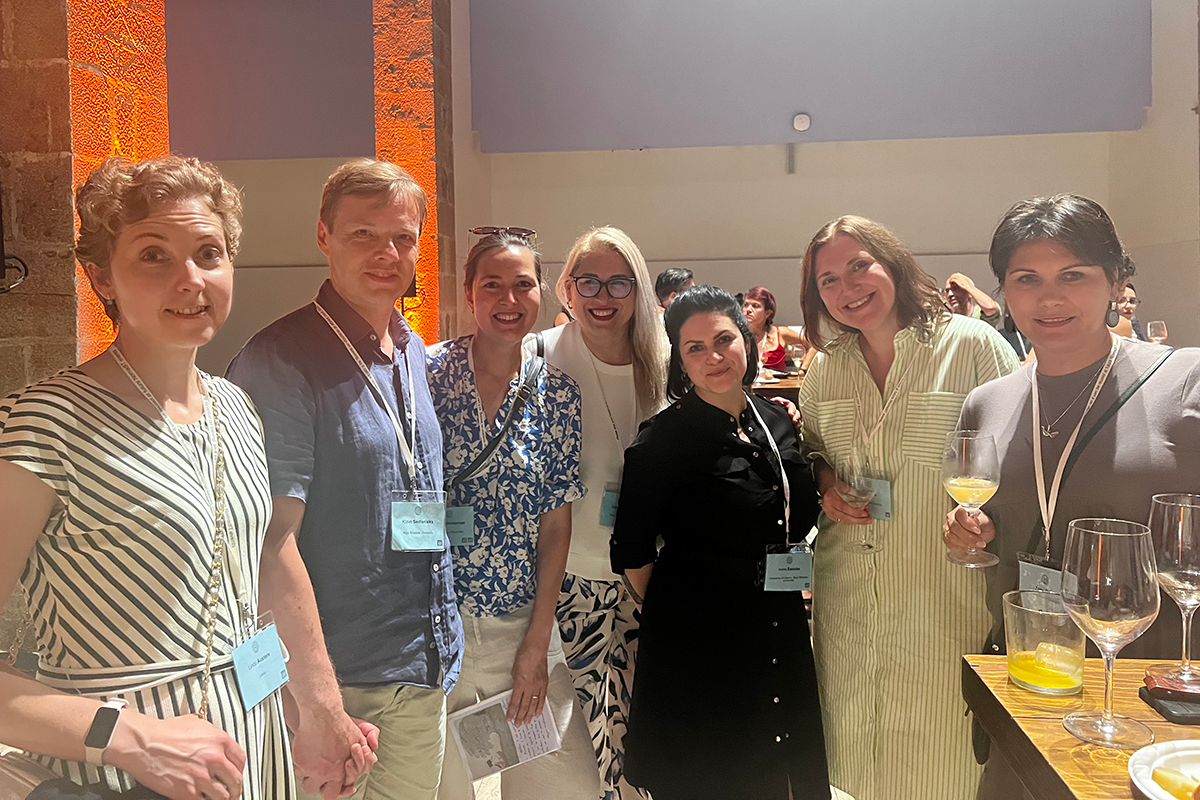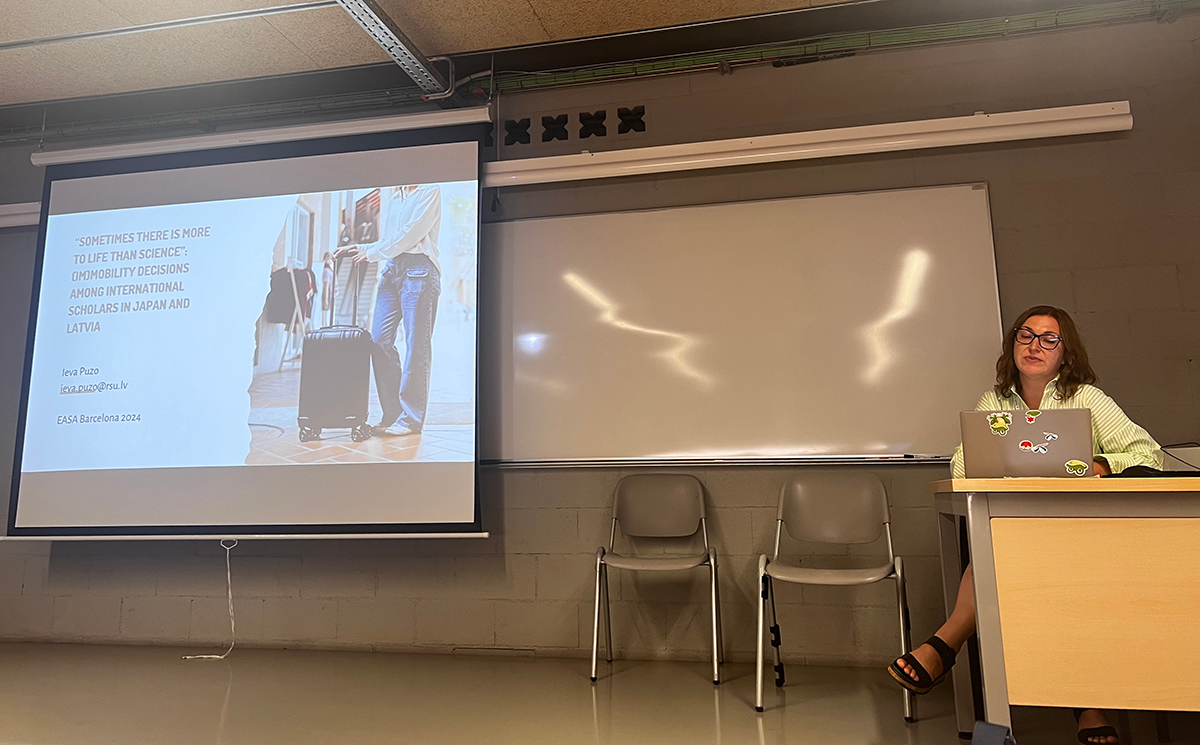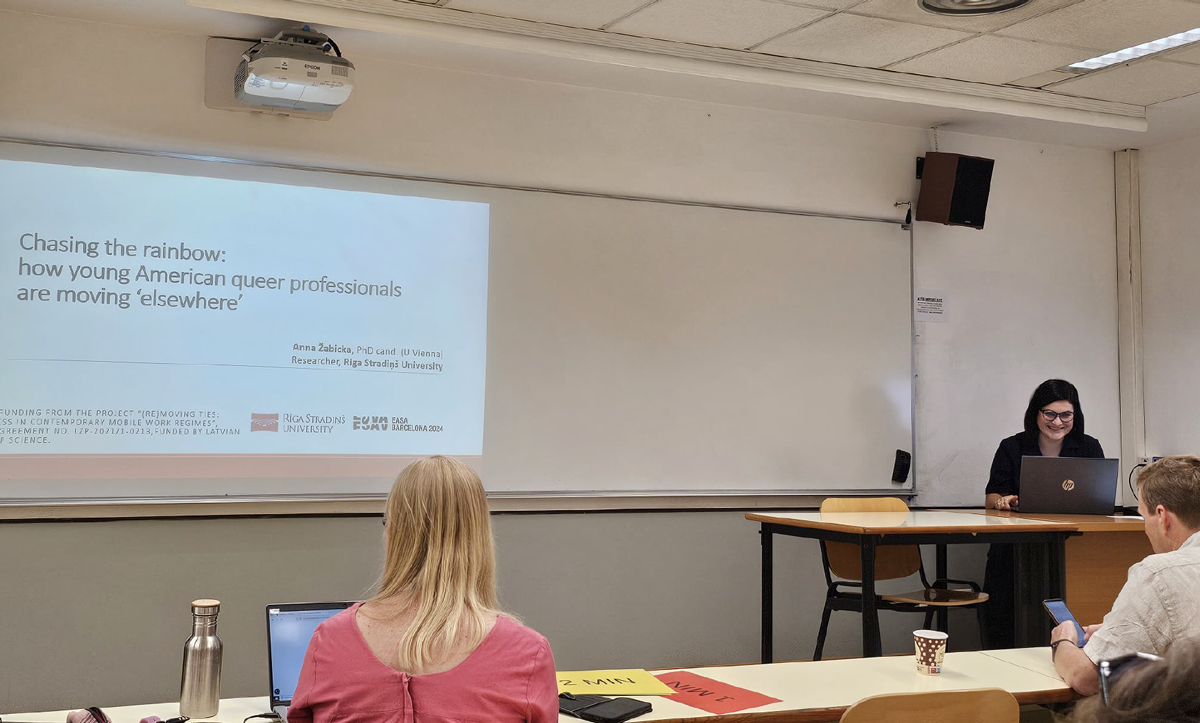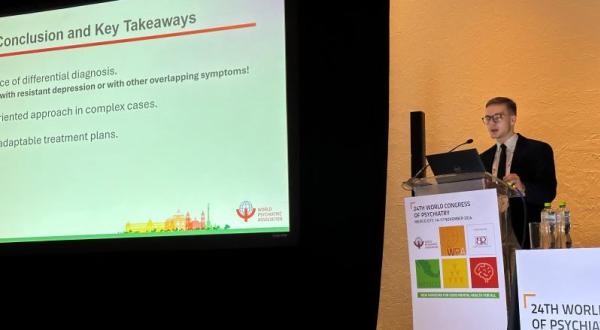RSU sociālantropologi piedalās lielākajā disciplīnas konferencē Eiropā
Šā gada 23.–26. jūlijā Barselonā norisinājās Eiropas Sociālo antropologu asociācijas (EASA) 18. biennāles konference Doing and Undoing with Anthropology, kurā piedalīsies vairāki projekta (Re)moving Ties pētnieki.

RSU pētnieki kopā ar citiem EASA dalībniekiem
Konferencē ar referātiem uzstājās projekta vecākā pētniece Ieva Puzo, asoc. prof. Klāvs Sedlenieks un pētniece Anna Žabicka.
Asoc. prof. Klāvs Sedlenieks kopā ar pētnieci Mari Korpelu (Mari Korpela) no Tamperes Universitātes organizēja paneli To tie or not to tie: skilled professionals, transnational mobility, family and friends [Anthropology and Mobility (AnthroMob)]. Panelī tika apskatīta darba mobilitātes ietekme uz personīgo dzīvi un attiecību uzturēšanu, un to, kā antropoloģiskās metodes var padziļināt zināšanas par šo tematu.
Tēzes
Mobility and the tie engineering
Klāvs Sedlenieks
In this presentation I invite to look at the process of geographical relocation from the perspective of relations by introducing a concept of “tie engineering”, i.e., a conscious or semi-conscious effort to manipulate human ties through varying physical/geographical distance among the target group. In other words: people are put together or drawn apart in such a way that the ties among them are either strengthened or severed. Such tie engineering is incorporated in policies of various institutions and are more often than not based on the assumption that weak ties (vid. Granovetter) should be strengthened and strong ties must be weakened. There are some cases though (e.g., anthropological fieldwork) where the opposite may be the case, but also to a certain degree. The institutionalised tie engineering does not exist separately from the ideas circulating among the general public and the people that are subjected to tie engineering. So that while there is a purposeful effort at the level of institutional policies, there is no less purposeful effort at the individual and personal level. The empirical material that illustrates the processes of tie engineering come from interviews with mobile professionals in three areas: academic, diplomatic and international organisations. I demonstrate that depending on the institutional goals the tie engineering practices may vary, but often result in similar personal problems across the board.
“Sometimes there is more to life than science”: (Im)mobility decisions among international scholars in Japan and Latvia
Ieva Puzo
 This contribution examines the tension between two contradictory factors shaping the (im)mobility of researcher workers: the demands of the dominant regimes of knowledge production and the importance of building and maintaining close relationships. At the discursive level, the “ideal” researcher is often portrayed as someone unencumbered by close personal ties and dedicating their life to science. The lived reality for many scholars, however, is quite different, as they struggle to balance their work and personal lives.
This contribution examines the tension between two contradictory factors shaping the (im)mobility of researcher workers: the demands of the dominant regimes of knowledge production and the importance of building and maintaining close relationships. At the discursive level, the “ideal” researcher is often portrayed as someone unencumbered by close personal ties and dedicating their life to science. The lived reality for many scholars, however, is quite different, as they struggle to balance their work and personal lives.
Based on semi-structured interviews with international scholars in Japan and Latvia as well as other ethnographic data, I suggest that personal considerations—relationships, kin ties, and the hope of creating them—constitute an important factor for research workers as they make decisions about their actual and potential employment locales. Rather than necessarily prioritizing the potentiality of movements to the “centers” of academic knowledge production, researchers often choose to cease the mobility expected of them by the contemporary regime of knowledge production and instead opt to remain in places significant in terms of personal ties—and places that may enable the creation of new relationships or the maintenance of already established ones. Turning the analytical lens to how mobility decisions are co-made by researchers and people close to them, opens a novel angle for examining the institutional and policy assumptions about academic mobility.
Chasing the rainbow: how young American queers are moving “elsewhere”
Anna Žabicka
 In addition to (precarious) work-based mobility that affects many young professionals in the United States, young queer professionals also evaluate potential political effects on their personal lives as queers: will they be able to form close romantic and/or kin relations? Will they feel safe on the streets? Will they be able “to be themselves”? Such alertness not only additionally affects career chances but also mobility paths.
In addition to (precarious) work-based mobility that affects many young professionals in the United States, young queer professionals also evaluate potential political effects on their personal lives as queers: will they be able to form close romantic and/or kin relations? Will they feel safe on the streets? Will they be able “to be themselves”? Such alertness not only additionally affects career chances but also mobility paths.
Based on in-depth interviews, I follow my interlocutors’ mobility paths from “red” (republican and/or conservative) states, cities, and towns to “blue” (democratic and/or liberal) states, cities, and “hubs” that lead to usually well-planned, although temporary “elsewheres” that provide a safe space and queer or queer-friendly community. Thus, in this paper, I explore the “elsewhereness” as in-betweenness that comes into being through hope for a place providing togetherness, a sense of belonging, very tangible safety, and “being oneself” combined with job offers or chances for education. In contemporary ever-changing political circumstances that affect LGBTQA+ people, “elsewhereness” becomes as much a process from “here” to “there”, as it is a state of “not-here/not-yet-there” that stems from enforced temporariness based on ever-present political alertness. “Elsewhereness” – that does and does not exist – becomes an imagined escape route within a country that is full of pockets of inequality and marginality.
Saistītās ziņas
 Pasaules psihiatrijas kongresā klausītāju augstu novērtēta RSU medicīnas studenta prezentācijaStudentiem, Pētniecība, Starptautiskā sadarbība, Psihiskā veselība un narkoloģija
Pasaules psihiatrijas kongresā klausītāju augstu novērtēta RSU medicīnas studenta prezentācijaStudentiem, Pētniecība, Starptautiskā sadarbība, Psihiskā veselība un narkoloģija

